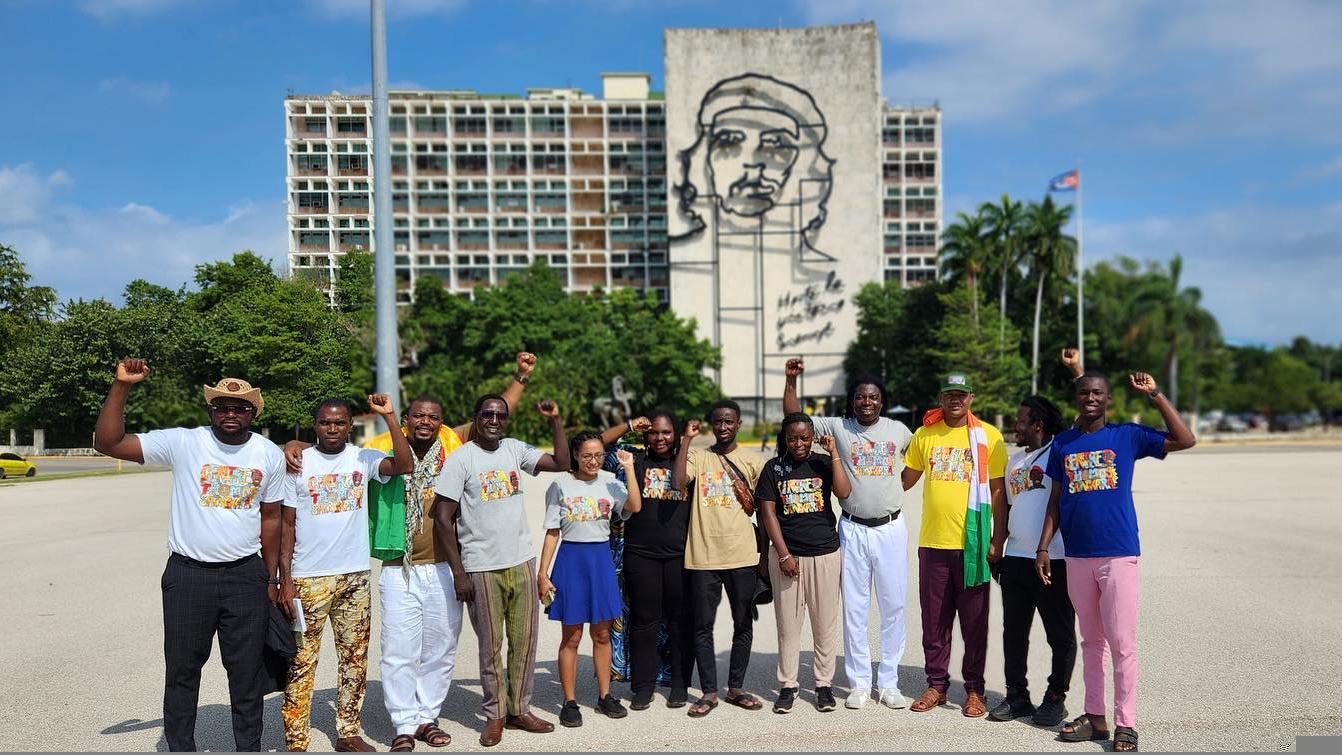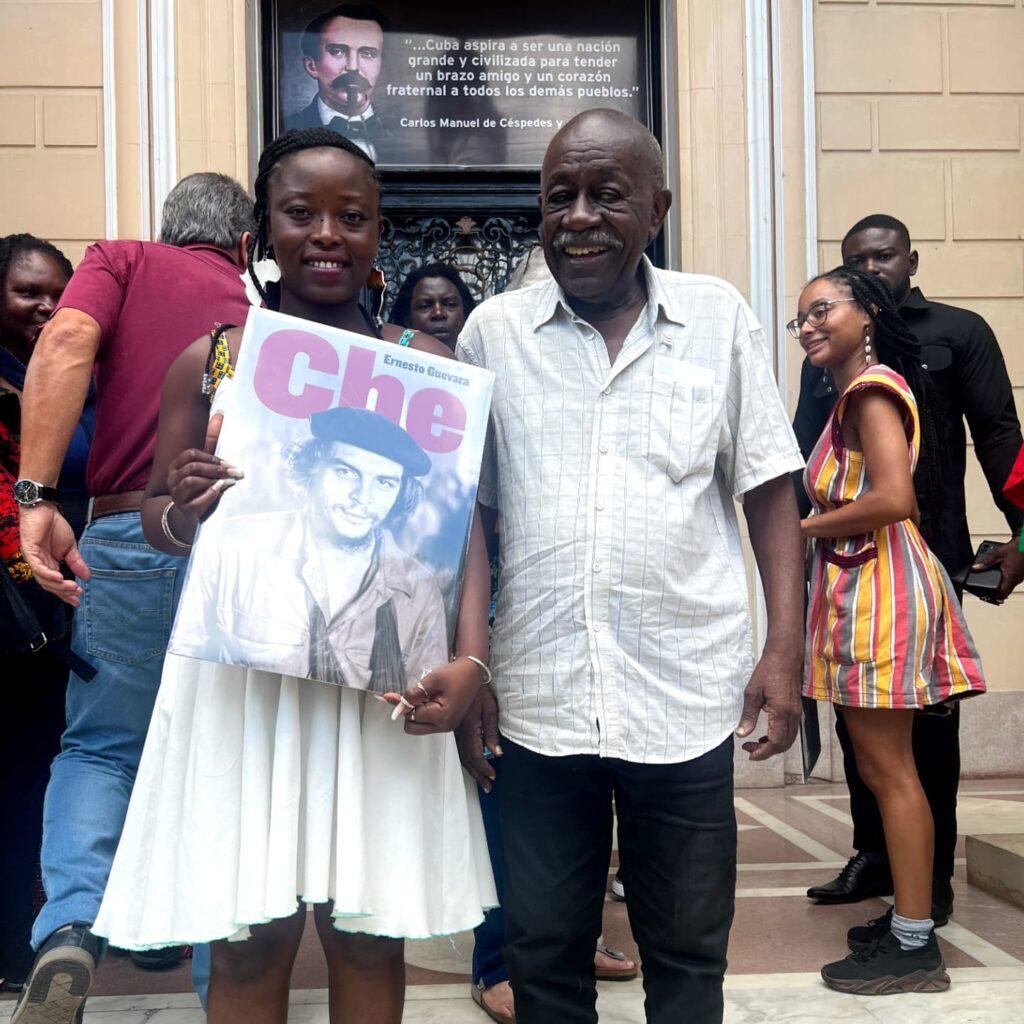
From November 8 to 15, twelve people from the countries of the Sahel visited Cuba to meet with Cuban people who carry forward the revolutionary project, and learn about Cuba’s socialist history and deep friendship with the peoples of Africa. The delegation sought to learn lessons from Cuba’s decades-long revolution to help advance the new revolutions being constructed in the Sahel.
This was the first delegation of Africans traveling to Cuba from the Alliance of Sahel States (AES), a Pan-African anti-imperialist confederation consisting of Mali, Burkina Faso, and Niger. The AES represents Africa’s newly emerged resistance bloc, which over the past year has confronted French and US neo-colonialism head-on by ending military occupations and forging ties with countries resisting NATO domination.
The delegates came from The Thomas Sankara Center for African Liberation and Unity (known also as Burkina Books) based in Ouagadougou, Burkina Faso, the Union of Nigerien Students (USN) and the Malian organization Headquarters of the Revolution (QGR). Once in Cuba, the delegation was warmly received by the Cuban Institute of Friendship with Peoples (ICAP).
A little bit of Africa in Cuba
“I will never understand how we in Africa have not made it much more of a priority to connect with Latin American people and why Africa’s leaders don’t work more closely with Latin America. Latin America is so African.” These were the words of Passamde ‘Océan’ Sawadogo, a Burkinabé reggae artist and Pan-African organizer, who on the final day of the delegation wrote a song about the unity of Africa and Latin America.
From the House of Africa (Casa de Africa) in Havana, to the Castle of San Severino in Matanzas, the delegation visited multiple museums in Cuba dedicated to the historical and contemporary relationship between the Caribbean island and the African continent. They revealed the profound influence of African cultures on the island of Cuba through music, food, clothing, dance, spirituality, and even how people relate to and understand one another.
The Cuban guides and museum directors explained that African history is deeply embedded into Cuba’s educational system and that Cubans, despite having different skin colors, share a national identity tied to their African heritage.
A little bit of Cuba in Africa
Throughout the delegation, the visitors from the Sahel met with people who had dedicated significant portions of their lives to fighting for the emancipation of the African continent, including people who contributed to the liberation of Angola such as Rolando Julio Rensoli Medina, the director of multiple Cuban anti-racism programs, and Andrés L. Morejón Ballarte, one of the directors of ICAP’s Africa and Middle Eastern division.
One of the exchanges that left the greatest mark on the AES visitors was a meeting with Dr. Aleida ‘Aleidita’ Guevara, the daughter of Ernesto Che Guevara, and Commander Victor Dreke, who was a military leader in the early struggles of the Cuban revolution, as well as in Congo and Guinea Bissau.

Dr. Guevara talked about her relationship with Ernesto Che Guevara, who was not just a revolutionary in his role outside of the home, but also a revolutionary in his personal life as a father and husband. Guevara is a medical doctor who spent time in Angola and spoke about some of her experiences in Africa. She was clear about the role women must play on the frontlines of the revolution.
Commander Victor Dreke spoke in detail about his experience as second-in-command after Ernesto Che Guevara in the liberation wars of the Democratic Republic of the Congo. Dreke showed up to the meeting with two Spanish-language anthologies of Thomas Sankara’s speeches, which he explained were a gift to his wife Ana Dreke who is a Sankarist. He also expressed his support for the revolutions sweeping the Sahel region, which led to a burst of applause and cheers from the delegation.
Victor Dreke, who is also the president of the Cuba-African Friendship Association, encouraged the delegation to check out Havana’s African Heroes Park, where they headed to after the meeting. In the park, children play soccer and families stroll in an open space surrounded by busts of Africa’s greatest revolutionary leaders, from Amilcar Cabral to Kwame Nkrumah to Samora Machel. Pape Diallo, a Malian member of the delegation, was particularly thrilled to see Mali’s Pan-African socialist independence leader and first president Modibo Keita, honored in Havana almost 8000 kilometers away from his home country.
Sahel revolutions and Cuba’s revolution: A two way exchange
Throughout history, revolutions across the African continent have been shaped or inspired by Cuba in various ways. This is particularly evident in Burkina Faso, where the national slogan under Thomas Sankara, and now readopted by President Ibrahim Traoré is “the homeland or death, we will succeed,” a quote by Fidel Castro that even features in Burkina Faso’s national anthem. But beyond the symbolism, the Cuban revolution shaped the contours and structures of Burkina Faso’s revolution.
In the city of Santa Clara, the AES delegation met with members of Cuban mass organizations such as National Association of Small Farmers (ANAP), the Union of Communist Youth (UJC), the Federation of Cuban Women, and the Committees for the Defense of the Revolution (CDRs).
Meeting with a representative of the CDRs was especially of interest for the Burkinabé travelers because under the leadership of Thomas Sankara, CDRs, modeled after those in Cuba, were adopted as the most fundamental unit of the revolution in Burkina Faso. In Burkina Faso today, many who participated in the Sankara-era CDRs are still around, and a new generation of militants known as the Citizen’s Nightwatch or the Wayiyans are seeking to learn from this historical model.
During this exchange, many of the Cubans were not only eager to share about their mass-based organizations, they also had many questions for the delegates about the history of CDRs as well as women’s emancipation campaigns during the Sankara-era of Burkina Faso’s history. This led to an open conversation about the similarities and particularities between revolution in the Sahel and Cuba, past and present.
The Cuban revolution and the future of the Alliance of Sahel States
“After this delegation, there are two convictions that I hold: That nothing is ever perfect. Everything is a process and we will always have to try to make things better, [and] that socialism is the pathway for humanity.” These were the words of Abdoul Salam Koussoubé from Burkina Faso who stated that the delegation completely opened his eyes.
He continued, “I, like so many others, always admired Cuba as a revolutionary project, but I always imagined that Cuba was extremely poor with correct values, but little material progress to show for it. I cannot believe how wrong I was. More people need to come to Cuba and see the progress with their own eyes. People need to see the truth.”
For many of the delegates, this experience in Cuba was their first time outside of the African continent. The entire delegation vowed to continue in the vocal defense of the Cuban revolution and to do everything in their power to promote closer ties between the Alliance of Sahel States and the Cuban government and people.
The AES delegation to Cuba has vowed to defend Cuba against the US blockade and other forms of imperialist aggression, and to continue to learn from and study the Cuban example so as to advance the struggle in the Sahel.
Thomas Sankara, Modibo Keïta, and other leaders from the Sahel have understood the necessity to build socialism as a fundamental part of the struggle for national liberation, sovereignty, and self-determination. The Malian, Burkinabé, and Nigerien travelers to Cuba feel an even stronger push to fight for socialism after seeing the progress of Africa’s sister revolution in Cuba.
Inemesit Richardson the president of the Thomas Sankara Centre for African Liberation and Unity (also known as Burkina Books), a revolutionary Pan-African socialist library and political education centre based in Ouagadougou, Burkina Faso. She is also a member of the All-African People’s Revolutionary Party and a journalist with African Stream.